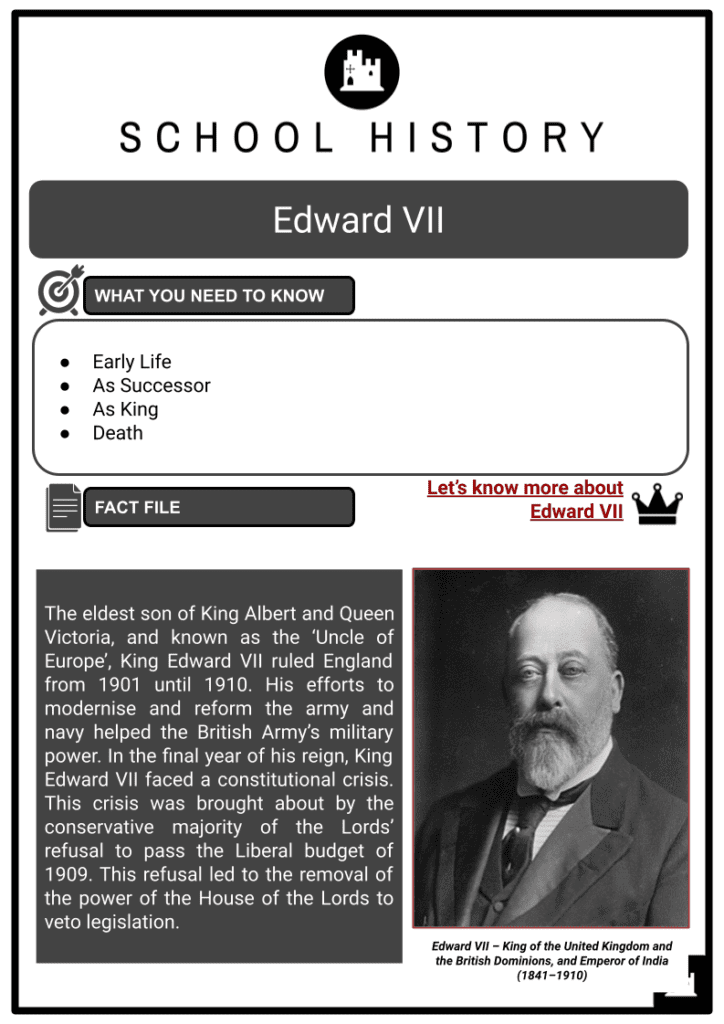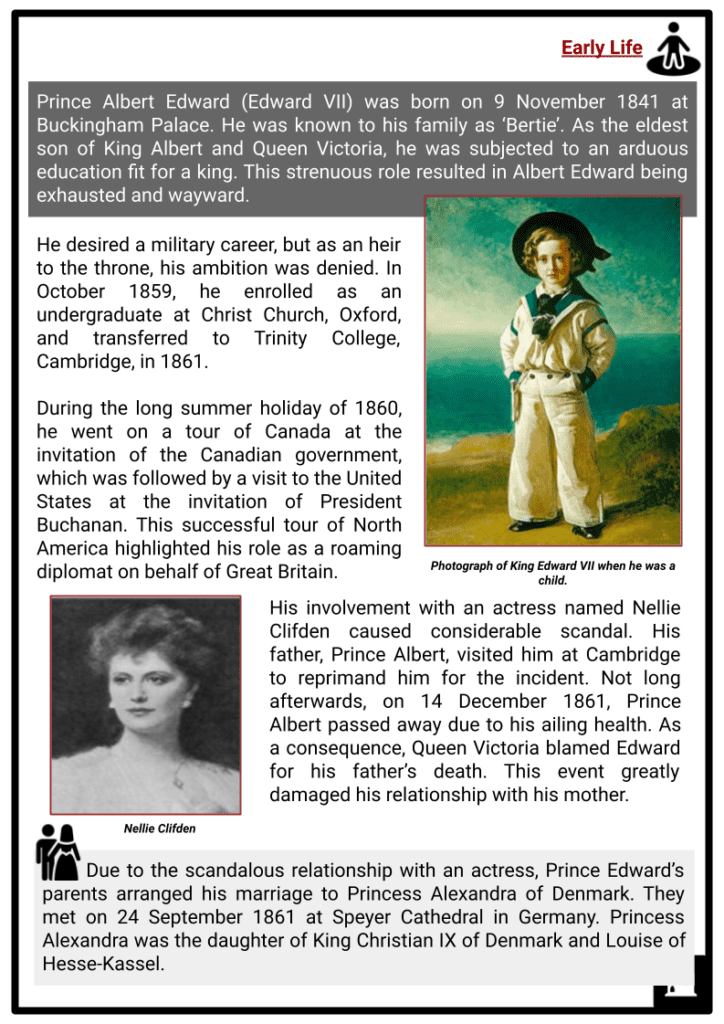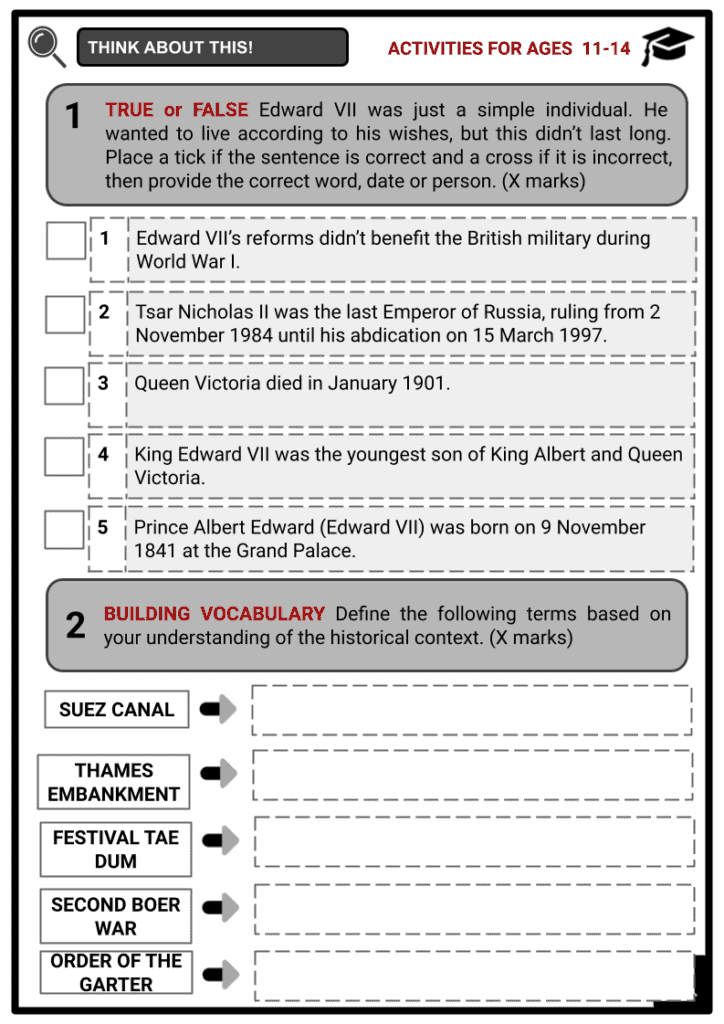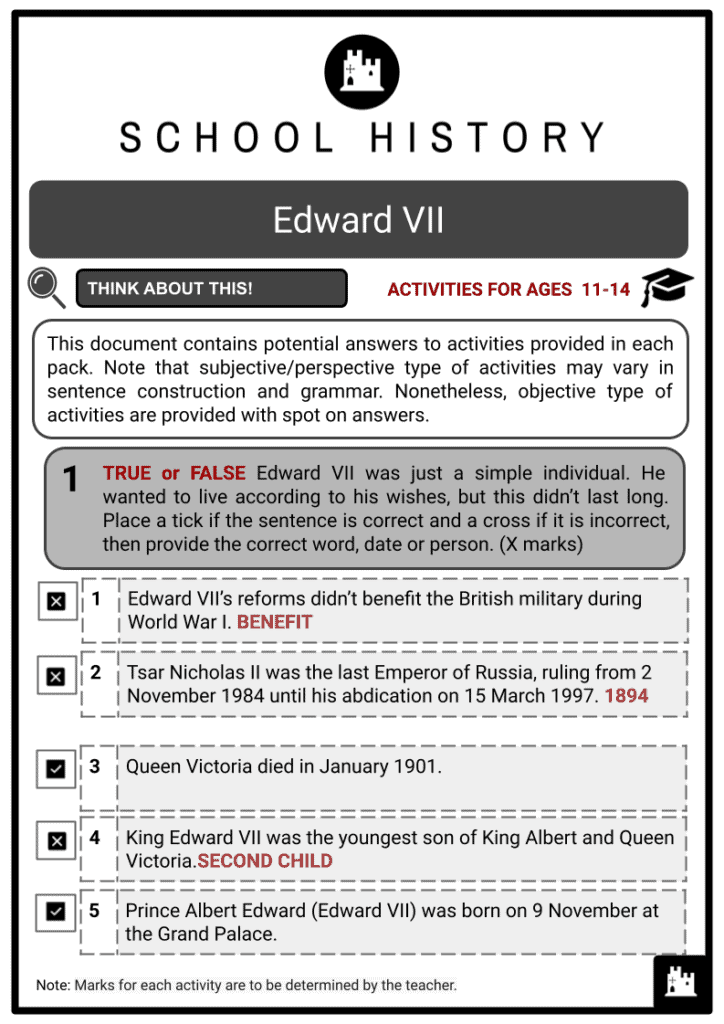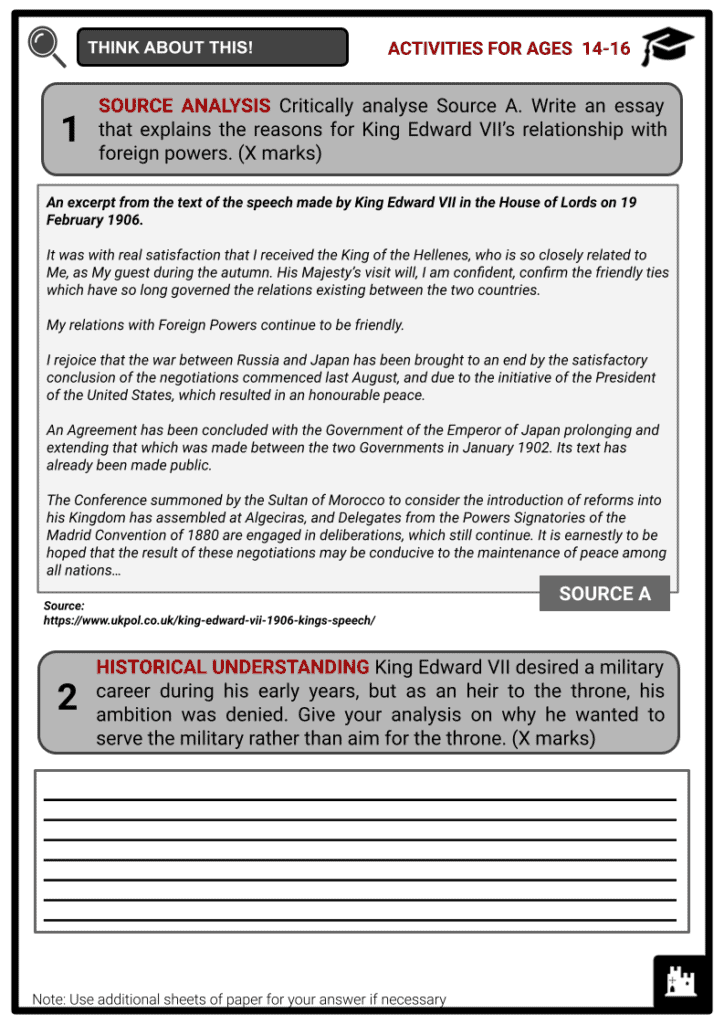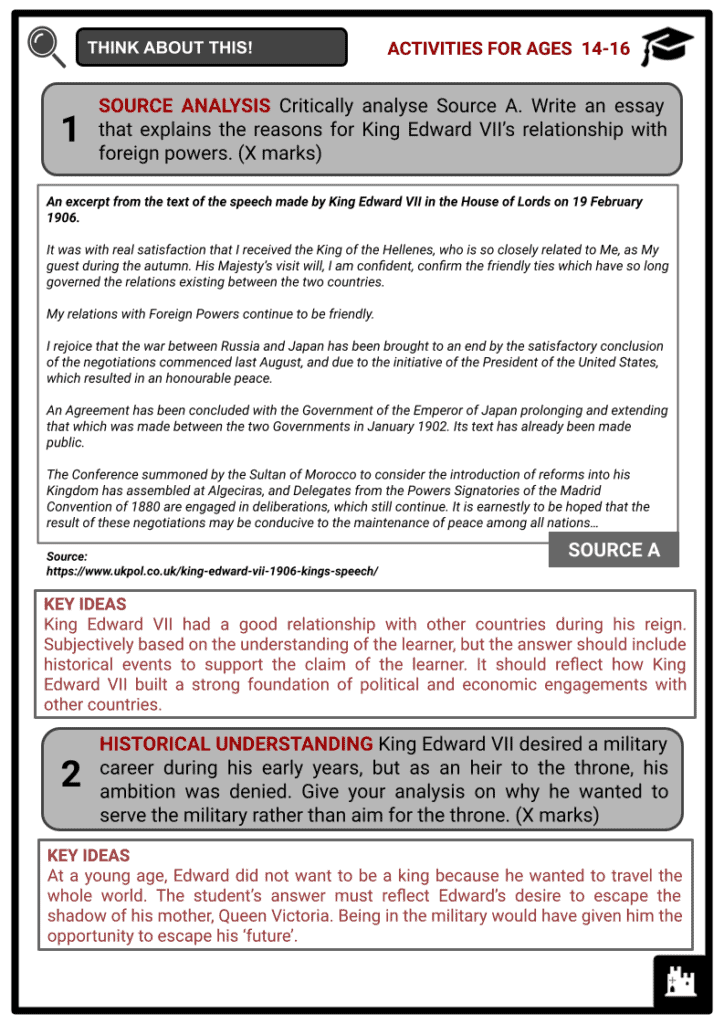Edward VII Worksheets
Do you want to save dozens of hours in time? Get your evenings and weekends back? Be able to teach about Edward VII to your students?
Our worksheet bundle includes a fact file and printable worksheets and student activities. Perfect for both the classroom and homeschooling!
Summary
- Early Life
- As Successor
- As King
- Death
Key Facts And Information
Let’s find out more about Edward VII!
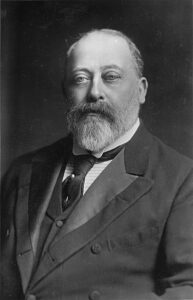
The eldest son of King Albert and Queen Victoria, and known as the ‘Uncle of Europe’, King Edward VII ruled England from 1901 until 1910. His efforts to modernise and reform the army and navy helped the British Army’s military power. In the final year of his reign, King Edward VII faced a constitutional crisis. This crisis was brought about by the conservative majority of the Lords’ refusal to pass the Liberal budget of 1909. This refusal led to the removal of the power of the House of the Lords to veto legislation.
Early Life
- Prince Albert Edward (Edward VII) was born on 9 November 1841 at Buckingham Palace. He was known to his family as ‘Bertie’. As the eldest son of King Albert and Queen Victoria, he was subjected to an arduous education fit for a king. This strenuous role resulted in Albert Edward being exhausted and wayward.
- He desired a military career, but as an heir to the throne, his ambition was denied. In October 1859, he enrolled as an undergraduate at Christ Church, Oxford, and transferred to Trinity College, Cambridge, in 1861.
- During the long summer holiday of 1860, he went on a tour of Canada at the invitation of the Canadian government, which was followed by a visit to the United States at the invitation of President Buchanan. This successful tour of North America highlighted his role as a roaming diplomat on behalf of Great Britain.
- His involvement with an actress named Nellie Clifden caused considerable scandal. His father, Prince Albert, visited him at Cambridge to reprimand him for the incident. Not long afterwards, on 14 December 1861, Prince Albert passed away due to his ailing health. As a consequence, Queen Victoria blamed Edward for his father’s death. This event greatly damaged his relationship with his mother.
- Due to the scandalous relationship with an actress, Prince Edward’s parents arranged his marriage to Princess Alexandra of Denmark. They met on 24 September 1861 at Speyer Cathedral in Germany. Princess Alexandra was the daughter of King Christian IX of Denmark and Louise of Hesse-Kassel.
- In 1862, Edward set out on another tour before marrying Princess Alexandra of Denmark. This extensive tour included places such as Egypt, Palestine, Lebanon, Syria and Turkey. This significant visit on behalf of the British government aimed to establish friendly relations with Egypt’s ruler. It was hoped that these friendly relations would be enough to prevent the French from seizing control of the Suez Canal.
- Mohamed Sa’id Pasha was the Wali of Egypt and Sudan from 1854 until 1863. The construction of the Suez Canal began under his tenure.
- The Suez Canal was built in 1854. The former French consul, Ferdinand de Lesseps, secured an agreement with Saʿīd Pasha, the Ottoman governor of Egypt, to build a canal 100 miles across the Isthmus of Suez. The Suez Canal is an important waterway trade route between Europe and Asia.
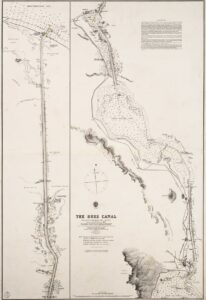
Nautical chart of the Suez Canal published shortly after the inauguration, with survey data from HMS Newport under George Nares. - After this obligation, Edward went back to Britain and married Princess Alexandra on 10 March 1863 at St George’s Chapel, Windsor Castle.
- Prince Edward and his wife, Princess Alexandra, went on to have six children. His marriage was filled with controversy and scandal. His involvement with other women continued with Lillie Langtry, Lady Jennie Churchill, Alice Koeppel, Agnes Keyser, and others.
As Successor
- Pained by the death of her husband, Queen Victoria withdrew almost completely from public affairs. Edward was allowed to represent her at state functions but was given almost no opportunity to participate in state affairs. He popularised the idea of royal public appearances.
- At public ceremonies and gatherings, he represented his mother at the opening of the Thames Embankment, the Mersey Tunnel, and Tower Bridge. He was the heir apparent to the British throne for 59 years. Prince Charles of Wales has been the longest heir-apparent in Europe since 1952, with a tenure of 70 years.
- In 1864, he irritated his mother (pro-German) by siding with Denmark on the Schleswig-Holstein question. The following year, he irritated her again by making a special effort to meet Giuseppe Garibaldi.
- In 1871, Edward contracted typhoid. There was a national concern about this event because this disease was believed to have killed his father. His recovery from the disease uplifted the relationship with his mother and his popularity with the public.
- In 1875, Edward set off on a tour of India. As remarked by his adviser, Prince Albert Edward had a habit of treating all people the same, regardless of their social station or colour. The prince complained in his letter about how British officials treated native Indians. He wrote about the racial and religious discrimination committed by British officials. His mother was given the title Empress of India at the end of the tour. This title was used to signify her rule over British India as its imperial head of state.
- The Festival Tae Deum is a composition by Arthur Sullivan, written to celebrate the recovery of Albert Edward, Prince of Wales (later King Edward VII of the United Kingdom) from typhoid fever. India had been under the control of the British since 1858, but giving this title was a gesture to link the monarchy with the empire further and bind India more closely to Britain.
- In 1883, he helped establish the Royal College of Music. As a patron of the arts and sciences, he said that ‘class can no longer stand apart from class…’ He claimed that music produced a union of feelings which he wished to promote.
- On 4 April 1900 there was an attempted assassination of King Edward by Jean-Baptiste Sipido in Belgium. Sipido’s assassination attempt was driven by his protests over the Second Boer War. Combined with the escape of Sipido and Belgian atrocities in Congo during the Second Boer Wars, this event worsened the relationship between Belgium and Britain.
- The Second Boer War was a conflict fought between the British Empire and the two Boer Republics (the South African Republic and the Orange Free State) over the empire’s influence in Southern Africa from 1899 to 1902.
As King
- In January 1901, Queen Victoria died. Edward inherited the throne as King Edward VII. His coronation was held on 9 August 1902 at Westminster Abbey. Known as the ‘Uncle of Europe’, Edward helped establish and foster good relations with its neighbouring countries. He was also known as a peacemaker and a tolerant man, without racial or religious prejudice.
- Edward renovated the royal palaces, reintroduced traditional ceremonies that his mother had abandoned, such as the State Opening of Parliament, and established new orders of decoration, such as the Order of Merit, to recognise contributions to the arts and sciences. In 1902, Mozaffar-al-Din, the Shah of Persia, visited England. He was expecting the Order of the Garter to be given to him by the new king. Edward refused to grant it to the Shah. His refusal threatened to damage the attempt to obtain British influence in Persia. In due course, he gave in and sent an envoy to the Shah with a full Order of the Garter the following year.
- The Order of the Garter is an order of chivalry founded by Edward III of England in 1348. In the British honours system, the Order of the Garter is the most senior order of knighthood, outranked in precedence only by the Victoria Cross and the George Cross.
- In 1903, he visited France as a guest of President Émile François Loubet. This trip was believed to be a contributing factor in the creation of the atmosphere for the Anglo-French Entente Cordiale.
- On 8 April 1904 the Entente was negotiated by the French foreign minister, Théophile Delcassé, the French ambassador, Paul Cambon, and the British foreign secretary, Lord Lansdowne. This agreement marked the end of centuries of Anglo-French rivalry. This agreement was also an attempt to counterbalance the growing dominance of Hungary by the German Empire and Austria.
- Edward VII actively participated in army reform. This need arose due to the failings of the war in South Africa. He supported the reorganisation of army command, the establishment of the Territorial Army, and the decision to provide an Expeditionary Force to aid France in the event of war with Germany.
- The feud in the navy between Admiral Lord Charles Beresford and First Sea Lord Admiral Sir John Fisher divided the service.
- He supported Fisher’s advocacy of scrapping obsolete vessels, efficiency savings, and deployment in home waters to counter the growing threat of the German fleet.
- He dismissed Lord Beresford. Though dismissed, Beresford continued his campaign outside the navy. Sir John Fisher resigned from his post in 1909.
- This led Edward to persuade Sir Arthur Wilson to succeed Fisher as Navy Admiral. Sir Arthur Wilson was an adviser at the start of World War I.
- In 1908, Edward visited the Russian Empire. He was the first British monarch to visit the empire. In previous years, Britain and Russia had experienced ill relations due to the Dogger Bank incident, the Russo-Japanese war, and the Tsar’s dissolution of the Duma.
- Tsar Nicholas II was the last Emperor of Russia, ruling from 1 November 1894 until his abdication on 15 March 1917.
- In 1909, the House of the Lords refused to pass the ‘People’s Budget’. This Liberal government proposal imposed unprecedented taxes on the lands and incomes of Britain’s wealthy in order to fund new social welfare programmes. This constitutional crisis continued even after the death of Edward. This refusal of the House of the Lords to pass the Liberal Budget of 1909 led to the removal of the House of Lords’ right to veto legislation.
- For a long time, Edward VII suffered from a lung disease called bronchitis. On 6 May 1910 Edward VII died at Buckingham Palace at the age of 68. Prior to his death, the king had several heart attacks but refused to rest.
Death
- He said that he would not give in, would continue and work until the end. His son (George V) informed him that his horse (Witch of the Air) had won the race. ‘I am very glad,’ were the final words of the king. In his short reign, King Edward VII proved to be a greater success than anyone had anticipated.
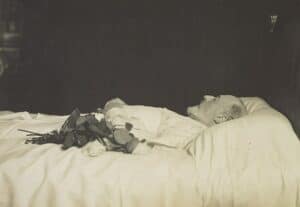
The body of the king on his deathbed, May 1910 - Starting with low expectations from his parents and despite being involved in controversy, he fulfilled the role of a monarch who contributed to boosting his kingdom’s relationship with its neighbouring countries.
- He received high praise for his affable and kind demeanour, as well as his diplomatic skills.
- His efforts to resolve the dispute between Britain and France and to establish a good relationship with Tsar Nicholas II of Russia benefited the international alliance of Britain.
- Also, his efforts to reform the British military aided the country greatly in the upcoming devastating events of World War I.
Image Sources
- https://en.wikipedia.org/wiki/File:King-Edward-VII_(cropped).jpg
- https://en.wikipedia.org/wiki/Suez_Canal#/media/File:Admiralty_Chart_No_233_The_Suez_Canal_-_The_Soundings_in_the_Canal_were_taken_by_Captain_Nares_and_the_Officers_of_H.M.S._Newport_in_February_1870_and_April_1871_RMG_F0136,_Published_1870_(cropped).tiff
- https://en.wikipedia.org/wiki/File:King_Edward_VII_after_death.jpg

